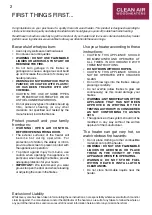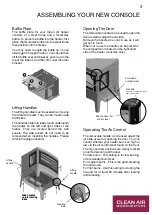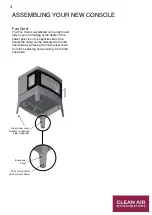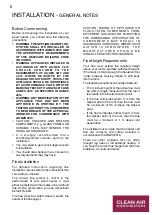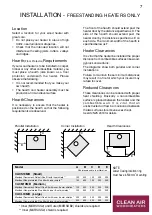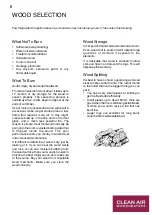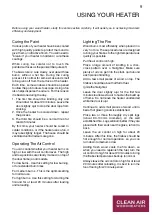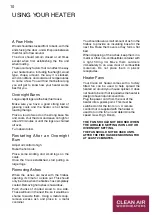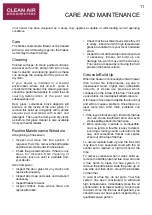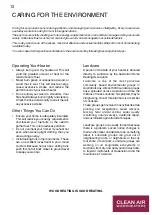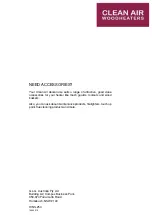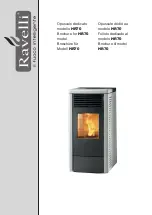
Caring for our planet means reducing pollution and managing our resources intelligently. Every resource we
use today we are borrowing from our future generations.
The key to successfully meeting our future energy requirements lies in our ability to manage existing resources
wisely. Unlike fossil fuels such as oil, coal and gas, wood can be managed on a sustainable basis.
This is why wood is one of the wisest, most cost effective and environmentally efficient forms of home heating
available today.
You can make a further positive contribution to the environment by following these important steps:-
Operating Your Heater
*
Always burn good, dry hardwood. This will
yield the greatest amount of heat for the
least amount of fuel.
*
Never burn green or unseasoned wood, or
wood that is wet. This will waste energy,
cause excessive smoke and reduce the
performance of your wood heater.
*
Do not allow your wood to smoulder. Your
fire should always burn brightly and cleanly.
Check the flue occasionally to see if there is
any excessive smoke.
Other Things You Can Do
*
Ensure your home is adequately insulated.
This will reduce your energy requirements,
and lessen your fuel bills, or the need to
gather fuel. This in turn reduces pollution.
*
Do not overheat your home! If you feel hot
even when wearing light clothing, then you
are wasting energy.
*
Install ceiling fans in the main rooms. These
are an excellent investment in year round
comfort. Because hot air rises, ceiling fans
push this hot air back closer to ground level
to keep you warmer.
Landcare
A portion of the sale of your heater is donated
directly to Landcare by the Australian Home
Heating Association.
Landcare is one of the most proactive
community based environmental groups in
Australia today. Almost 5000 Landcare groups
have sprouted across Australia and like the
millions of trees Landcare has planted, they're
still growing. One of three farmers is a member
of Landcare.
These groups get involved in activities like tree
planting and revegetation, weed removal,
fencing, feral animal control, water quality
monitoring, nature surveys, riverbank repair,
and sustainable agricultural techniques.
Landcare groups are usually formed because
there is a problem. Locals notice changes in
their environment and decide to do something
about it. Landcare groups can grow out of
neighbouring farms, or neighbours in the city
that share a local park. Landcare groups are
working on all imaginable ecosystems in
Australia, from dry and dusty central Australia,
to tropical rainforests of Queensland and the
mountains in Tasmania.
WOOD HEATING IS GOOD HEATING
CARING FOR THE ENVIRONMENT
12
Summary of Contents for CACL19MB
Page 9: ......


